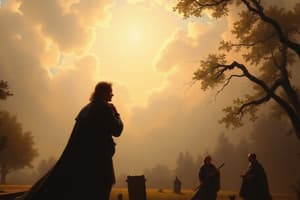Podcast
Questions and Answers
What is the main difference between Old Lights and New Lights?
What is the main difference between Old Lights and New Lights?
Old Lights rejected the Great Awakening while New Lights accepted it.
What did the New Lights believe (theologically)?
What did the New Lights believe (theologically)?
They believed in a more emotional, passionate appeal to religion and in predestination.
New Light preachers were __________ who felt like they could trigger a person's rebirth __________.
New Light preachers were __________ who felt like they could trigger a person's rebirth __________.
Evangelicals, Suddenly
What did the Old Lights believe (theologically)?
What did the Old Lights believe (theologically)?
Old Lights believed a person would be reborn over the course of a....
Old Lights believed a person would be reborn over the course of a....
What caused the division into Old and New Lights?
What caused the division into Old and New Lights?
What did the divisions in churches cause (affected America as a whole)?
What did the divisions in churches cause (affected America as a whole)?
In what way was America starting to develop its identity?
In what way was America starting to develop its identity?
Who did people become critical of during the Great Awakening?
Who did people become critical of during the Great Awakening?
Is it possible that the Great Awakening was a contributing factor in preparing America for the American Revolution?
Is it possible that the Great Awakening was a contributing factor in preparing America for the American Revolution?
How did the Great Awakening affect the colonies?
How did the Great Awakening affect the colonies?
Did propaganda work?
Did propaganda work?
What is Old Light propaganda?
What is Old Light propaganda?
What is New Light propaganda?
What is New Light propaganda?
Describe the rise in Secularism in the colonies.
Describe the rise in Secularism in the colonies.
How did the Great Awakening react to Secularism?
How did the Great Awakening react to Secularism?
Who was George Whitefield?
Who was George Whitefield?
Who was Jonathan Edwards?
Who was Jonathan Edwards?
Between 1662 to the early 1700s, what was happening to Puritan beliefs?
Between 1662 to the early 1700s, what was happening to Puritan beliefs?
What is predestination?
What is predestination?
What is total depravity?
What is total depravity?
What are itinerants?
What are itinerants?
What is secularism?
What is secularism?
What does H.A.P.P.Y. stand for?
What does H.A.P.P.Y. stand for?
What is a primary source?
What is a primary source?
What is a secondary source?
What is a secondary source?
What can help give you clues when dissecting a primary/secondary source?
What can help give you clues when dissecting a primary/secondary source?
Flashcards are hidden until you start studying
Study Notes
Old Lights vs. New Lights
- Old Lights rejected the Great Awakening, critiquing it through negative propaganda.
- New Lights embraced the Great Awakening, favoring emotional engagement in religious practices.
Theological Beliefs
- New Lights promoted passionate religious experiences, emphasizing predestination and the necessity of being reborn to achieve salvation.
- Old Lights adhered to traditional religious views, valuing virtue and stability, and considered emotional appeals as chaotic and disruptive.
Preachers and Evangelism
- New Light preachers were called Evangelicals, believing they could trigger sudden rebirth in individuals.
Impact of Division
- The emotional focus of New Light preachers led to a split, with Old Lights opposing the idea that conversions were meaningful without genuine reflection.
- The divisions between Old and New Lights resulted in the emergence of various religious denominations, increasing America's religious diversity.
Emergence of American Identity
- The Great Awakening prompted colonists to feel more connected to a broader society rather than their individual communities.
Criticism of Authorities
- The movement fostered skepticism towards local religious leaders, highlighting personal salvation and encouraging challenges to established authorities.
Influence on the American Revolution
- The Great Awakening may have contributed to revolutionary sentiments by fostering a sense of community while questioning various forms of authority.
Religious Revival in Colonies
- The movement shifted focus back to religion, combating the rising secularism caused by increasing colonial wealth and indifference to traditional faith.
Propaganda Use
- Both Old and New Lights utilized propaganda effectively; Old Lights depicted emotional preaching as chaotic, while New Lights presented their message in a positive light to engage followers.
Secularism's Rise
- A decline in genuine faith led to a perception of religion as a mere routine, prompting the Great Awakening as a response emphasizing deep religious renewal.
Key Figures
- George Whitefield was an itinerant preacher known for his powerful and passionate delivery, able to instill fear regarding salvation and divine judgment.
- Jonathan Edwards was a prominent Congregationalist preacher advocating for intense religious experiences and emphasizing God's overwhelming power.
Calvinist Concepts
- Predestination: The belief that God determines salvation at conception, urging individuals to seek signs of their chosen status.
- Total Depravity: The notion that all humans are inherently sinful, with salvation granted only to a select few by divine grace.
Itinerant Preachers
- Traveling preachers like George Whitefield and Jonathan Edwards spread the messages of the Great Awakening, often leading revival meetings.
Understanding Sources
- Primary Source: A first-hand account from individuals directly involved in an event.
- Secondary Source: Accounts that interpret or analyze primary sources, created after the event.
- When examining sources, consider the author, context, and location for insights.
H.A.P.P.Y. Framework
- Historical Context, Audience, Point of View, Purpose, and Importance are key elements for analyzing documents effectively.
Studying That Suits You
Use AI to generate personalized quizzes and flashcards to suit your learning preferences.




